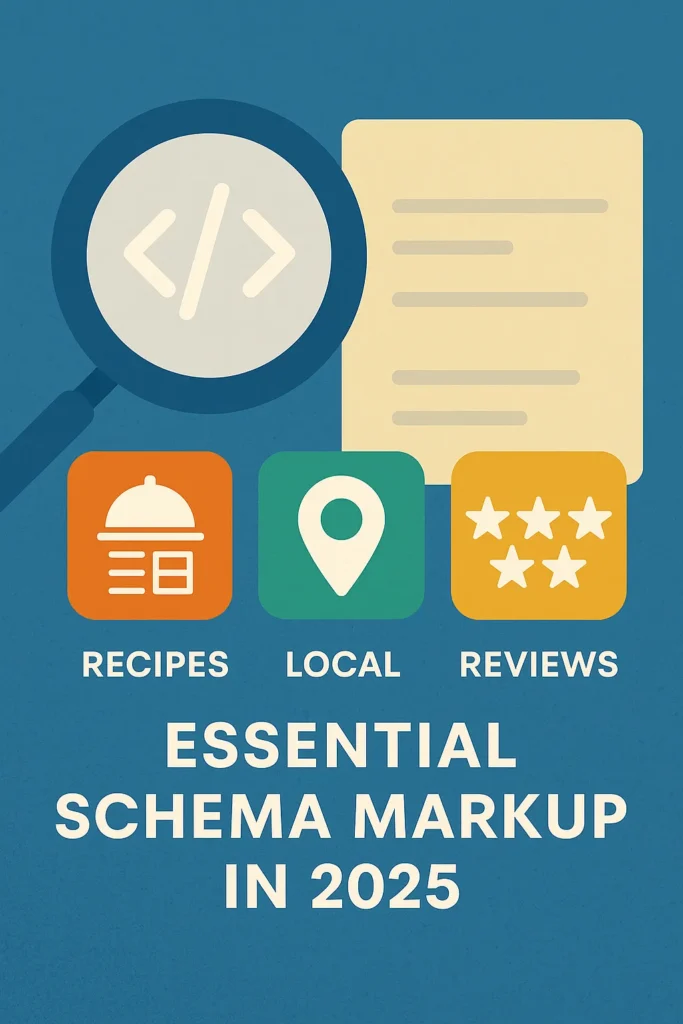
Essential Schema Markup in 2025 Recipes, Local, and Reviews
In 2025, Schema Markup is no longer optional. With the evolution of Google’s search experience and AI-powered overviews, structured data has become a core requirement for SEO. Whether you run a recipe blog, manage a local business, or sell products online, adding structured data can mean the difference between being invisible and standing out with rich results.
In this guide, we’ll explore:
-
What Schema Markup is and why it matters more than ever in 2025
-
How to use Schema for recipes, local businesses, and reviews
-
Best practices and common mistakes
-
FAQs on rich snippets and SEO
What Is Schema Markup and Why Does It Matter in 2025?
Schema Markup (also known as structured data) is code you add to your website so search engines better understand your content.
It doesn’t change how a page looks for visitors, but it helps Google decide how to display your page in search results.
In 2025, this matters more because:
-
AI Overviews: With Google’s AI-powered search, structured data helps your site be picked up for conversational answers.
-
Rich snippets drive clicks: Listings with stars, cooking times, or map pins stand out compared to plain text results.
-
Competition is tougher: Everyone does basic SEO. Schema is now the differentiator that boosts visibility.
Schema for Recipes
If you run a food or lifestyle blog, recipe Schema is a must. It allows Google to display:
-
Featured images of dishes
-
Cooking and prep times
-
Calories and nutritional information
-
Average ratings from users
Example JSON-LD Code
{
"@context": "https://schema.org/",
"@type": "Recipe",
"name": "Homemade Chocolate Cake",
"image": "https://example.com/images/chocolate-cake.jpg",
"author": {
"@type": "Person",
"name": "Jane Doe"
},
"datePublished": "2025-01-10",
"description": "A simple and delicious homemade chocolate cake recipe.",
"prepTime": "PT20M",
"cookTime": "PT30M",
"totalTime": "PT50M",
"recipeYield": "10 servings",
"recipeCategory": "Dessert",
"recipeCuisine": "American",
"aggregateRating": {
"@type": "AggregateRating",
"ratingValue": "4.8",
"reviewCount": "150"
}
}

Schema for Local Businesses
For local shops, restaurants, gyms, or service providers, Schema is critical for appearing in Google’s Local Pack and Maps results.
Google pulls business details like:
-
Address and location
-
Opening hours
-
Phone number
-
Price range
Example JSON-LD Code
{
"@context": "https://schema.org",
"@type": "Restaurant",
"name": "Village Pizza",
"image": "https://example.com/images/pizza.jpg",
"address": {
"@type": "PostalAddress",
"streetAddress": "123 Main Street",
"addressLocality": "Boston",
"addressRegion": "MA",
"postalCode": "02108",
"addressCountry": "US"
},
"telephone": "+1-555-123-4567",
"openingHours": "Mo-Su 11:00-23:00",
"priceRange": "$$"
}

Schema for Reviews
If you sell products or services, review Schema can highlight ratings directly in the SERPs. Seeing stars and review counts immediately increases trust.
Example JSON-LD Code
{
"@context": "https://schema.org",
"@type": "Product",
"name": "Gaming Laptop X15",
"image": "https://example.com/images/gaming-laptop.jpg",
"description": "Gaming laptop with 16GB RAM and RTX 3060 graphics card.",
"sku": "GLX15",
"aggregateRating": {
"@type": "AggregateRating",
"ratingValue": "4.6",
"reviewCount": "248"
}
}

Best Practices for Schema in 2025
-
Use JSON-LD (Google’s recommended format)
-
Validate code with Google’s Rich Results Test
-
Keep information updated (hours, addresses, ratings)
-
Combine multiple Schema types (e.g., LocalBusiness + Reviews)
-
Ensure markup matches the actual page content
Common Mistakes to Avoid




FAQs About Schema Markup
1. Does Schema guarantee rich snippets?
No, it increases the chances, but Google decides when to display them.
2. Do I need coding knowledge?
Not necessarily. Plugins like Yoast SEO or Rank Math handle Schema automatically for WordPress users.
3. What’s the most important Schema in 2025?
-
For recipe bloggers → Recipe Schema
-
For restaurants and stores → LocalBusiness Schema
-
For e-commerce → Reviews & Product Schema
4. Can Schema improve voice search visibility?
Yes. Structured data makes it easier for AI assistants and Google to pull accurate answers for voice queries.

Final Thoughts
In 2025, Schema Markup is not just a technical SEO trick — it’s essential for visibility and trust.
Recipes benefit from images, times, and ratings.
Local businesses gain exposure in Maps and Local Packs.
Reviews increase CTR and conversions with social proof.
If you want to stand out in Google’s evolving search landscape, Schema must be a core part of your SEO strategy.









